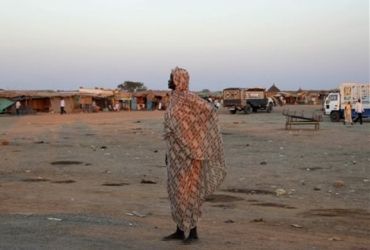South Sudan says voter eligibility for Abyei referendum remains “a grey area”
July 18, 2012 (JUBA) – South Sudan said on Wednesday that Sudanese president, Omar al-Bashir, has agreed to hold a referendum to determine the future of the contested Abyei region but that voter eligibility still remains a “grey area”.

“The talks are progressing well. We have been holding direct discussions without involving a third party. Actually this spirit started with lead negotiators. Sudanese defense minister Abdel Rahim Mohamed Hussein and I started direct discussions after returning from Khartoum”, Pagan Amum, South Sudan’s lead negotiator, said on Wednesday.
Amum confirmed that South Sudan’s president Salva Kiir pledged a transitional financial package to the government of neighbouring Sudan to close financial gap created by the secession which allowed Juba to inherit three-quarters of oil production.
When South Sudan seceded in 2011, analysts said that the oil would prevent a return to war and ensure stability in the relations between the two countries. However, it is now one of the main causes of conflict between them and complicated the resolution of the other issues.
Amum added that Bashir had confided to Kiir during the meeting in Addis Ababa his commitment to resolving all outstanding issues, including the final status of Abyei.
Luka Biong Deng, a chief representative of South Sudan’s president at the Abyei Joint Oversight Committee also expressed optimism at the possibility of reaching a final agreement on the status of the area and confirmed Bashir’s agreement to hold a referendum for the area, but made no mention of a consensus reached over voter eligibility.
“The issue of voter eligibility remains a grey area. The South is expected to make this issue of eligibility clear and to include Ngok Dinka and other residents, except nomads from the north or South. Equally the chairperson of the referendum commission should be somebody who knows the context as the opinion of the commissioner will be critical in the conduct of the exercise,” said Deng.
Abyei is a contested region between the two Sudan’s. It is overdue a referendum which it was afforded as a stipulation of the 2005 Comprehensive Peace Agreement which ended Sudan’s civil war. The referendum which would allow its citizens to vote on its future is yet to happen as the eligibility of different ethnic groups is still a matter of contention; specifically the nomadic Misseriya who spend part of the year in Abyei and a traditionally aligned to Khartoum.
“A referendum for Abyei will be held. President Bashir has accepted the formation of the Abyei referendum commission. Five members will be selected. They will nominate two people and we will nominate two other people and a chairperson will be given to someone with an independent political and ethnic affiliation to the two sides”, Amum explained.
He said Kiir told the South Sudanese lead negotiating team in Addis Ababa, after their direct discussion, that Bashir pledged to “take two steps” to resolving the conflict whenever Kiir “takes one step forward”, to prove his seriousness and commitment to settle the disputes between the two countries.
Amum also explained that Kiir “officially conveyed one solid message of acceptance of the African Union Peace and Security Council (AUPSC) Roadmap by the Government of South Sudan and compliance with United Nations Security Council (UNSC) resolution number 2046. President Kiir also pledged commitment of the leadership of government of South Sudan to assisting Sudan with transitional financial package and readiness to assisting Sudan in resolving disputes in the two areas”.
He also explained that South Sudan “will use our contacts with friendly countries forgo debts with Sudan but only when we agree to resolve all outstanding issues”.
Sudan has been subject to United States (US) economic sanctions since 1997. The US Congress, which is hostile to Khartoum, refuses to remove it, stating that the Darfur conflict, Abyei, and now the South Kordofan humanitarian crisis be resolved before they consider the issue.
Pagan further added that another presidential summit would be held before the deadline of 2 August, during which the duo would review details of the negotiations and discuss possible final solutions to ending impasses.
Luka Biong, from his side, praised president Kiir for holding direct talks with president Bashir without involving third party. He added that the “move was appreciated by all the circles”.
(ST)
